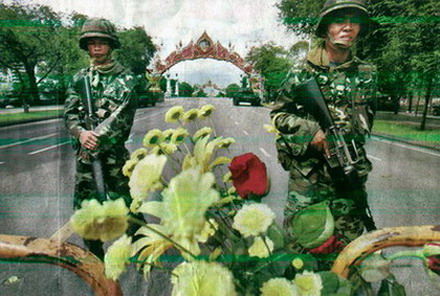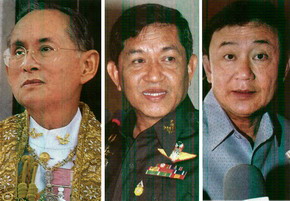September 21st 2006 / Press release from SCMP
 |
The king of Thailand last night on September 20th 2006 endorsed the military coup that ousted Prime Minister Thaksin Shinawatra, as the new ruling generals promised a general election would be held by October next year. King Bhumibol Adulyadej formally appointed coup leader General Sondhi Boonyaratkalin as head of the so-called Council of Administrative Reform "in order to create peace in the country". For many in Thailand, the coup was a clash between two men: an arrogant prime minister and a humble king who always wins. The king's role in the dramatic coup that ousted Mr. Thaksin is not yet clear. Speaking out is not the style of the 78-year-old monarch, who despite age and frailty has shown that he remains the most powerful man in the country. King Bhumibol Adulyadej, who has reigned for 60 years - more than any living monarch - has outlasted 20 prime ministers, 15 constitutions and at least as many coups. |
After the bloodless coup late on Tuesday September 19th, some in the streets of Bangkok seemed unfazed, certain that the king would again see them through crisis. The king's endorsement came hours after Prime Minister Thaksin Shinawatra flew to London from New York, where he had been attending the United Nations General Assembly. He is apparently resigned to the end of his five-year rule. With a new constitution in the works, there is an uncertain future for both Mr. Thaksin and his Thai Rak Thai Party.
On the face of it, the bloodless coup was a military affair led by army Chief Sondhi Boonyaratkalin, who said the overthrow as needed to resolve a protracted political crisis and restore "harmony among the people". It remains unclear exactly what role the king played in removing Mr. Thaksin. The palace claims it was not involved, but many Thais, along with political and monarchy experts, see it is another example of the constitutional monarch behind-the-scenes power, which he has exercise sparingly but effectively in his six-decade reign.
There was no one event that led to Mr. Thaksin's overthrow, but a series of missteps that prompted many to accuse the prime minister of challenging the king's authority ?an unpardonable act in Thailand. Mr. Thaksin defied months of street protests and demands for him to resign amid allegations of corruption, election violations and a worsening Muslim insurgency in the south. Chief among his flaws, in the eyes of the palace and many Thais, was his personality. The tycoon-turned-politician proved to be ambitious, conservative and strong-willed, refusing to correct himself when his policies backfired ?particularly in the case of a strong-arm military approach to violence in the south, where more than 1,700 people have died over the past two years. Critics call him self-centered and arrogant. He was also accused of stifling what was once one of Asia's freest media and of allowing his business and political cronies to reap enormous gains from corrupt policies. Some say the palace was infuriated by Mr. Thaksin's apparent attempt to steal the spotlight during the king's lavish June celebrations for his 60 years on the throne when he breached protocol by greeting visiting royalty ahead of the monarchy. The king could be described as Mr. Thaksin's opposite.
Born into a family of Chinese silk merchants in 1949 in the northern city of Chiang Mai, Mr. Thaksin went from being a policeman to a telecoms mogul. The small computer dealership he set up with his wife in 1987 to sell hardware to the police force evolved into Shin Corp, a telecoms conglomerate with interests ranging from mobile phones to satellites, the internet and the media. It was on the strength of his business acumen, combined with promises of cheap health care and rural handouts that Mr. Thaksin swept to power in 2001. But then it all went wrong. Graft scandals began to erode his support from Bangkok's middle class, and that festering anger exploded in January when his relatives sold ?tax-free ?their US$1.9 billion stake in Shin Corp to a Singaporean firm. A string of rallies calling for his head ensued, with 130,000 people turning out after retired general Chamlong Srimuang ?his former political mentor who led a successful 1992 protest against Thailand's last military government ?joined the campaign. It quickly became clear the ill will rose right to the top of the military and establishment as top royal adviser Perm Tinsulanonda, another general and former prime minister, launched a string of thinly veiled attacks. Square-jawed in adversity, Mr. Thaksin refused to back down, denouncing "charismatic individuals" seeking to oust him by "unconstitutional means". In a country that has seen 23 coups or attempted coups in 74 years of on-off democracy, that was asking for trouble.
Mr. Thaksin recently warned of high-level plots to depose him, in what was widely considered an attack on the king chief advisor, the retired General Perm Tinsulanonda. The populist billionaire enjoyed vast support among rural Thais but the capital's elite turned against him over his business deals and alleged corruption. The return of military rule in Thailand's first coup in 15 years has sparked international concern and condemnation.
General Sondhi said yesterday he made the decision to drive out Mr. Thaksin and vowed to appoint a neutral, democratic civilian interim leader within two weeks. A new constitution would be drafted to replace the document scrapped by his generals in Tuesday night's coup, with full elections held before October 2007. He also hinted at a possible prosecution of Mr. Thaksin and his Thai Rak Thai cronies, whose rule he described as corrupt.
General Sondhi led the precision takeover without firing a shot, sending soldiers and tanks to guard major intersections and surround government buildings. He insisted his generals acted alone, denying backing or approval from the king. General Sondhi has repeatedly played down coup rumors in recent weeks, insisting that Thailand's political system had moved beyond military intervention and that such a move ran counter to the king's wishes. A constitutional monarch, King Bhumibol has only rarely intervened in politics during his 60-year reign.
Bangkok remained quiet last night after a martial-law imposed "holiday" that saw banks, the stock exchange and government offices shut. For some young Bangkok residents, Tuesday's coup proved to be little more than a source of entertainment. Business is expected to resume today. Tanks and armored personnel carriers were seen moving about the city last night, fortifying key points. Armed soldiers patrolled streets across the city, often seen laughing and chatting with passers-by. Some draped yellow ribbons on their guns ?the color marking the king recent 60th anniversary celebrations. Residents of Bangkok awoke yesterday to grey skies and tanks, but this quietest of coups found many in a strangely sunny mood. It has been a tense few weeks in the capital, with rumors of impending coups by pro- and anti-Thaksin forces swirling amid the foiling of an alleged plot to assassinate the controversial caretaker leader. Although an undercurrent of uncertainty remains, amid reports of panic buying of food, the prevailing mood yesterday seemed to be a rather sanguine acceptance of temporary military rule. Bangkok's first morning under the rule of the Council of Administrative Reform was greeted not with the staccato chatter of gunfire but by the toe-tapping strains of jazz tunes broadcast over the television channels commandeered by the military, set to soothing montages of His Majesty the King performing good deeds. |
 |
Thais were even encouraged to join in, as the words to a patriotic song scrolled across the screen, karaoke-style. Later, as steely drizzle continued to fall, the tanks remained in massed ranks. But there were smiles on the faces of some of the soldiers and a party atmosphere among the few who had braved the rain to gawk.
There were three key players in the events of Tuesday September 19th 2006, but it is the towering figure of King Bhumibol that remains the one constant of Thai politics. Throughout months of political stalemate, Thai army commander General Sondhi Boonyaratkalin swore the military had moved on from its days of meddling in government. But having broken the mould as the first Muslim military chief in the overwhelmingly Buddhist country, the decorated Vietnam War veteran demonstrated that some habits are just too tough to kick. With Prime Minister Thaksin Shinawatra in New York, General Sondhi and his counterparts in the navy, air force and police carried out Thailand's 18th military coup in 74 years of on-off democracy. Whatever the long-term outcome, the move was a major about-turn for General Sondhi, who took up the position as army commander-in-chief a year ago, painting himself as a modern, professional soldier who shunned interference in politics. |
 |
For further information and details on the situation of Thailand, please refer to the US Embassy's website in Bangkok: http://bangkok.usembassy.gov/index.htm